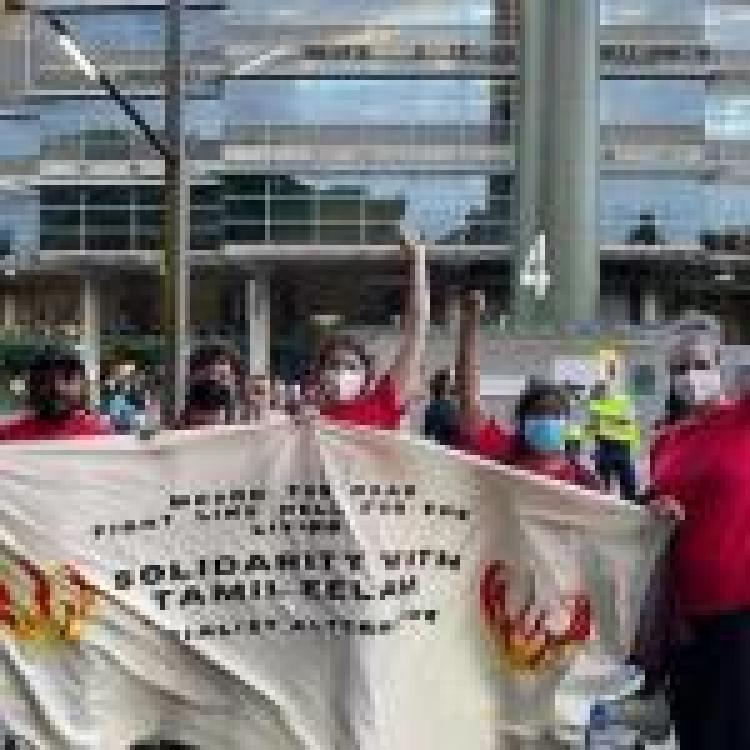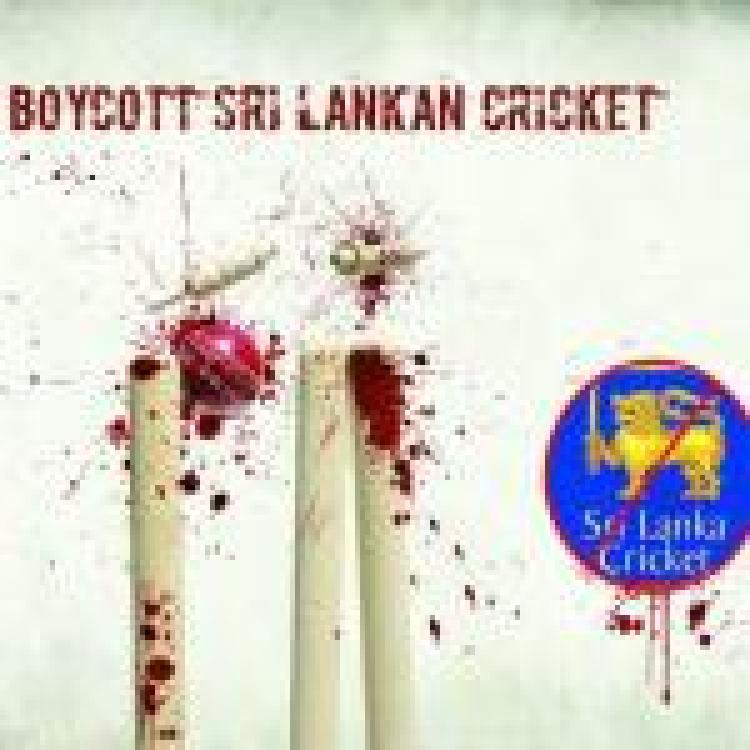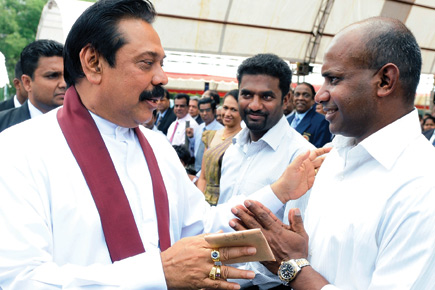
The former cricketer and ex-parliamentarian with the Rajapaksa clan, Sanath Jayasuriya, has been appointed as the interim coach of Sri Lanka's national team, as they prepare to tour England later this year.
Jayasuriya is a controversial figure, having aligned himself with war criminals and himself served a two-year ban from cricket-related activity by the International Cricket Council's (ICC) anti-corruption unit, after he failed to co-operate in a corruption investigation. He was also previously a member of parliament representing the ruling Sri Lanka Freedom Party (SLFP), under then-president Mahinda Rajapaksa. A year later, aged 41, he rejoined the Sri Lankan cricket team, a move slammed as a “selfish and an overtly political act”.
In 2019, Jayasuriya fervently campaigned for Gotabaya Rajapaksa’s Sri Lanka Podujana Peramuna (SLPP). During his campaigning, he tweeted that Rajapaksa is “the only leader who can create a better tomorrow” and said the presidential election date will “change the destiny of Sri Lanka”.
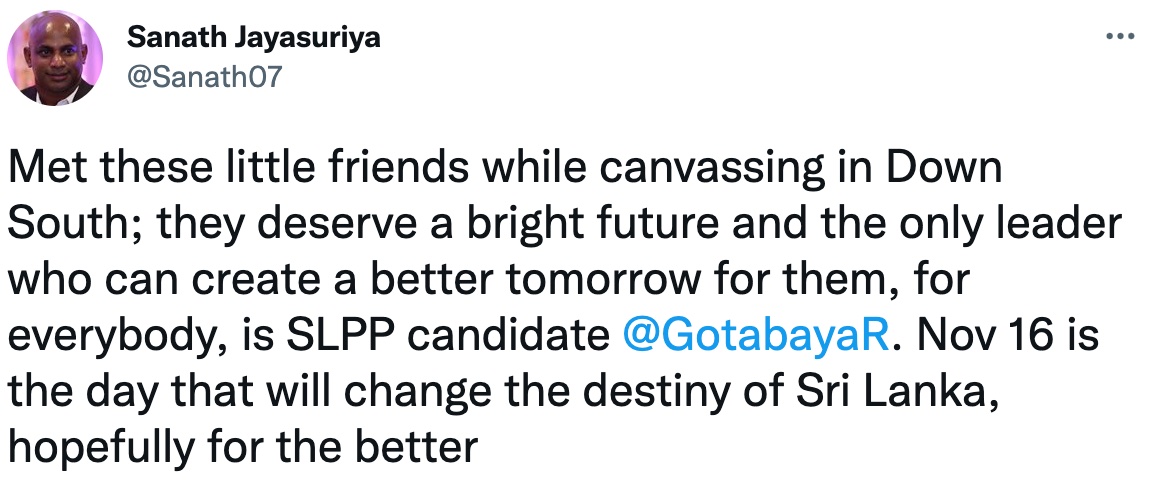
In the wake of Rajapaksa’s victory, Jayasuriya tweeted “this indicates the confidence we Sri Lankans have on you”. “Be assured of my commitment to strengthening your hands all the way.”

Both of the Rajapaksa brothers are accused of war crimes having overseen an offensive that killed tens of thousands of Tamil civilians in 2009. The massacres are increasingly being recognised as a genocide. They are both barred from entry into Canada due to their record of rights abuses.
'England must take a principled stand'
Previous Sri Lankan cricket tours of England have seen protests and boycott campaigns, calling on the British government to ensure Sri Lanka is boycotted from international sport until human rights concerns have been addressed.
“The Sri Lankan government has not changed,” said Theepan, an activist who worked on previous ‘Boycott Sri Lankan Cricket’ campaigns. “To this day, tens of thousands of Tamils remain unaccounted for and the perpetrators of war crimes continue to roam entirely free.”
“Jayasuriya is a man who has openly praised and collaborated with war criminals,” Theepan continued. “Why is someone like him being allowed to lead a team that represents a genocidal state across the UK for a cricket tour?”
“Our calls have not changed. In an era where athletes across the globe are taking principled stands against racism, we urge the England team and players to do the same.”
The English cricket team has previously undertaken historic sporting boycotts, refusing to tour Apartheid South Africa in the 1970s and boycotting Zimbabwe in 2008. Campaigners are now urging England to do the same with Sri Lanka.
The call has a history going back decades, when Tamil activists in the 1970s and 80s would protests outside stadiums and stage pitch invasions as Sri Lanka played in England, as part of long-standing campaigns for justice and accountability.
The end of the armed conflict in 2009, where the government led by Rajapaksas oversaw the shelling of hospitals and execution of surrendering Tamils, saw the demands reinvigorated and gaining international attention.
In 2011, sportswriter of the year and former England cricket captain Mike Atherton wrote in The Times that the “Tamils’ plight must prick English consciences”.
“The United Nations’ inaction on the evidence of war crimes looks inexcusable,” he added. “If that continues, it is likely that questions will be asked about the suitability of England’s tour to Sri Lanka, scheduled for this winter. After all, there seems little to differentiate President Rajapaksa’s brutal regime from that of Robert Mugabe’s in Zimbabwe, about whom English consciences were severely pricked.”
“Only a fool thinks that sport and politics do not mix," wrote Andy Bull, sports writer with The Guardian. "England’s cricketers will be expected to play against a man who is a direct representative of a government accused of war crimes on a horrific scale by the United Nations. The politics of the matter is not outside the ground or behind a metal fence any more. It is right there in the middle of the pitch and it cannot be ignored.”

Australian protestors in 2013 call for a boycott of Sri Lanka.
At the time England’s tour to Sri Lanka went ahead, but it raised high profile questions on the role the sport in whitewashing the regime. “The English cricketing authorities plumped to resume ‘business as usual’ in a country which is facing international excoriation in the light of a growing mountain of evidence pointing to horrific war crimes,” wrote Jon Snow, a veteran British broadcaster in 2012. “Amid the sweat, the heat, and the romance of this colonial ground, cricket has ensured that a whole world of sport is absorbed in a game, whilst the fate of up to 40,000 civilians (UN expert panel estimate) slaughtered on fields on the very same island lie unaddressed and largely unmentioned.”
“Should England’s cricket team tour Sri Lanka?,” wrote Channel 4 News Foreign Editor Ben De Pear, as a copy of the documentary ‘Sri Lanka’s Killing Fields; War Crimes Unpunished’ was handed to the then manager of England’s team.
Atherton would write again on Sri Lanka, stating that with the call up of Sanath Jayasuriya, who was then a parliamentarian in Rajapaksa’s party “the alignment of cricketing and political interests in Sri Lanka is laid bare”.
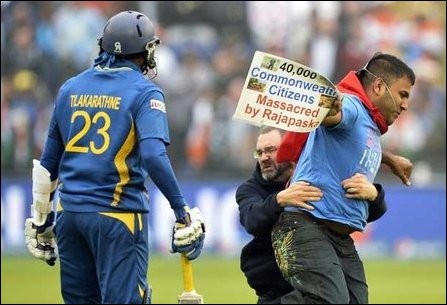
A British Tamil protestor holds a placard as he disrupts play in Cardiff, 2013.
In the years since, the resurgence of the Rajapaksa regime has only exposed and consolidated those links further. In addition to the management of the Hambantota stadium being taken over by the military, in 2022 the Sri Lankan army announced that two of the country’s “internationally-famed professional cricketers” have been commissioned as majors in the military, as Silva pinned rank insignia on them.
The military, which is playing an increasingly prominent role in civilian life across the island, has tens of thousands of soldiers deployed across the North-East. England’s cricketers, however, will be confined to playing in the south of the island.
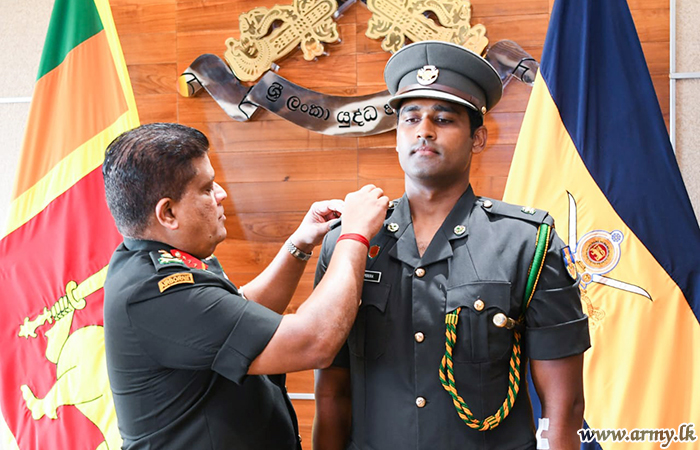
Britain's current Secretary of State for Culture, Media and Sport is Lisa Nandy, who has previously reaffirmed her party's demands for concrete action on Sri Lanka, including a referral to the International Criminal Court.
"We pushed in March for the UN resolution to include concrete measures, such as an International Independent Investigative Mechanism (III-M) and for a referral of cases to the International Criminal Court (ICC)," she told the Labour Pary conference in 2021. "These concrete steps are really important to us."
It remains unclear on whether the British government will take any action over the upcoming tour, which is set to take place in August 2024.

